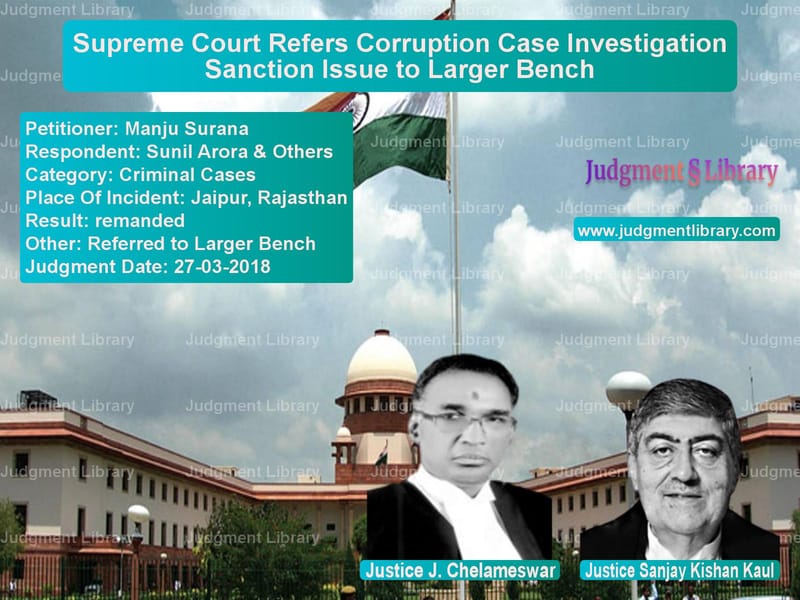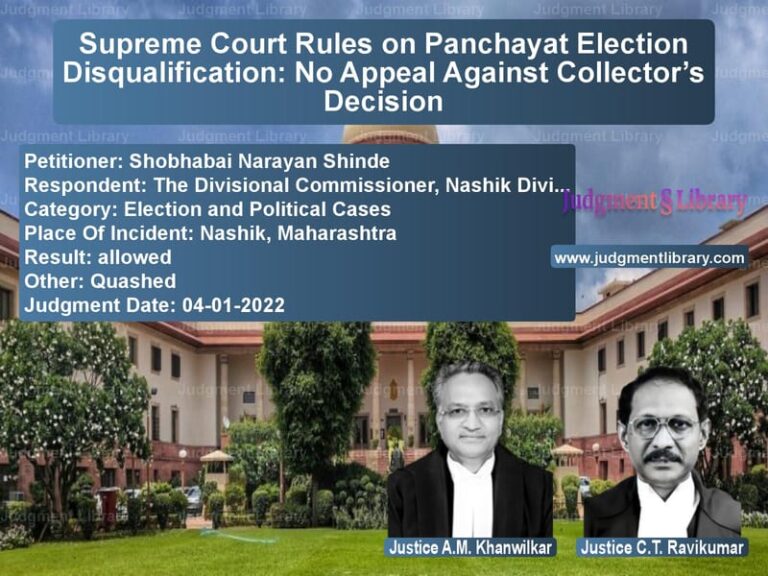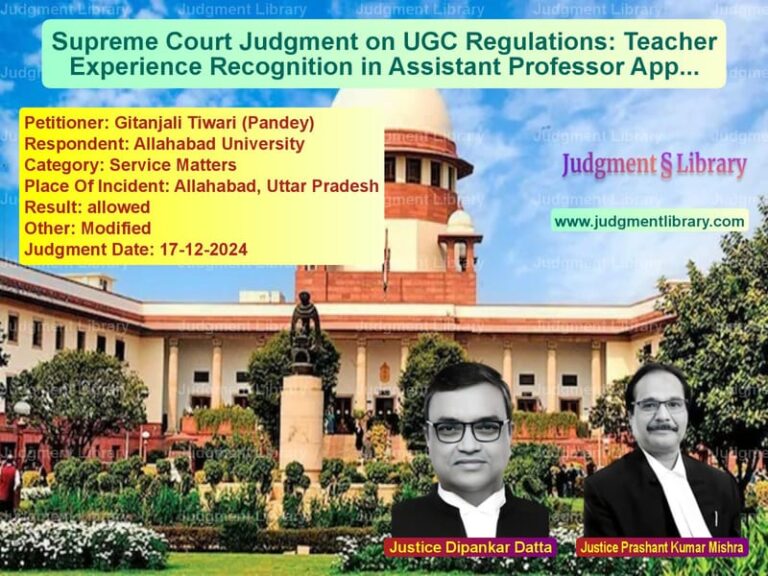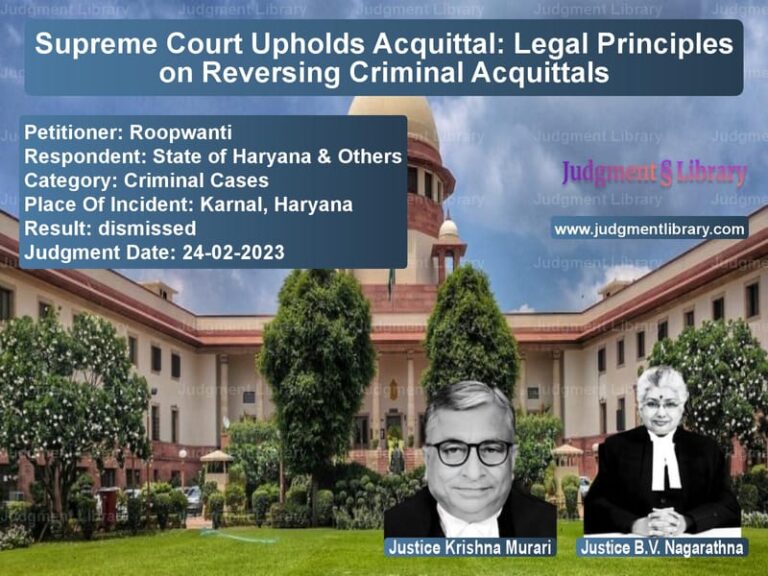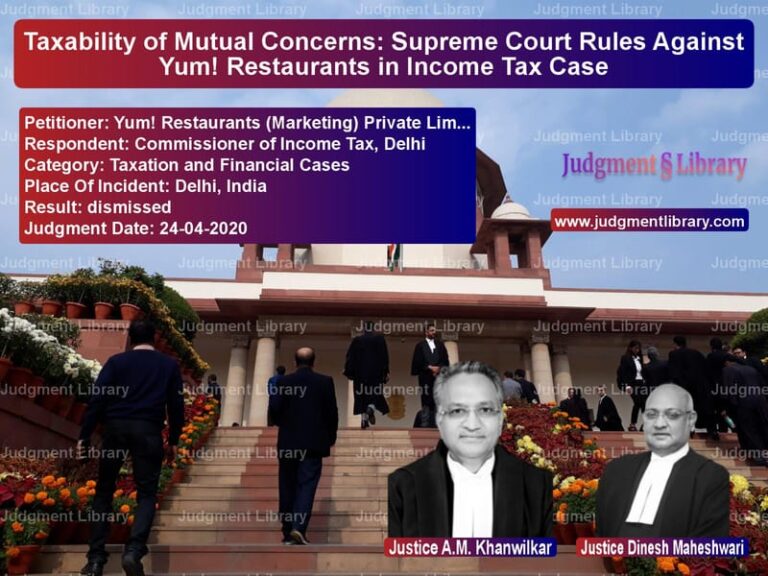Supreme Court Refers Corruption Case Investigation Sanction Issue to Larger Bench
The case of Manju Surana vs. Sunil Arora & Others is a significant ruling regarding the requirement of prior sanction for investigating public servants accused of corruption. The Supreme Court addressed whether an investigation under Section 156(3) of the Criminal Procedure Code (CrPC) can be initiated without obtaining prior sanction under Section 19 of the Prevention of Corruption (PC) Act. Given the conflicting precedents on this matter, the Court referred the issue to a larger bench for authoritative resolution.
Background of the Case
The case originated from a complaint filed by Manju Surana before the Special Judge (Prevention of Corruption Act, Jaipur), alleging corruption in a drinking water project. The complaint sought an investigation and registration of an FIR against several high-ranking officials, including the Principal Secretary to the Chief Minister, Superintending Engineer, Chief Engineer, the then Chief Minister, a former Minister, the Finance Secretary, the Deputy Accountant General, and a private company.
The Special Judge dismissed the complaint, citing the lack of prior sanction under Section 19 of the PC Act and Section 197 of the CrPC. The Rajasthan High Court upheld this decision, prompting the appellant to seek relief from the Supreme Court.
Petitioner’s Claims (Manju Surana)
The appellant, Manju Surana, argued:
- That sanction was required only at the stage of taking cognizance, not for initiating an investigation.
- The High Court’s reliance on Anil Kumar vs. M.K. Aiyappa was incorrect, as it conflated the stage of investigation with prosecution.
- Previous Supreme Court rulings established that an investigation under Section 156(3) CrPC does not amount to cognizance.
Respondent’s Claims (Sunil Arora & Others)
The respondents, including the accused public servants, contended:
- That prior sanction was a mandatory prerequisite before initiating an investigation against a public servant.
- The ruling in Anil Kumar vs. M.K. Aiyappa correctly established that an order under Section 156(3) CrPC involves application of judicial mind, equating it with cognizance.
- The complaint was politically motivated and lacked substantive merit.
Supreme Court’s Observations
The Supreme Court identified a clear divergence of legal opinions and the necessity to settle the matter authoritatively. The Court stated:
“There is a distinction between an inquiry at the pre-cognizance stage under Section 156(3) and an inquiry under Section 202 of the CrPC after cognizance has been taken. The question remains whether prior sanction applies at both stages.”
Highlighting the ambiguity in the law, the Court further remarked:
“The scope of an investigation under Section 156(3) is to collect material to determine whether a prima facie case exists. To demand prior sanction at this stage would render the investigative process ineffective.”
Key Findings of the Supreme Court
- The legal position regarding prior sanction at the pre-cognizance investigation stage remains unclear.
- Conflicting rulings in Anil Kumar vs. M.K. Aiyappa and other cases necessitate a larger bench’s authoritative interpretation.
- Public interest demands that corruption cases be investigated thoroughly while also protecting public servants from harassment.
Final Judgment
The Supreme Court ruled:
- The matter was referred to a larger bench for resolution.
- Pending cases involving similar issues would be guided by the larger bench’s decision.
- No further proceedings would be undertaken in the current case until the larger bench’s ruling.
Key Takeaways from the Judgment
- Clarification on Prior Sanction: The case will determine if prior sanction is required before a corruption case investigation can commence.
- Balancing Public Interest: The ruling will impact how corruption allegations against public servants are probed.
- Judicial Precedent: The larger bench’s decision will set a binding precedent for future corruption investigations.
Conclusion
The Supreme Court’s decision to refer the matter to a larger bench highlights the complexity of balancing the need for corruption investigations with the protection of public officials from frivolous cases. The outcome of this reference will have a significant impact on anti-corruption proceedings in India.
Petitioner Name: Manju SuranaRespondent Name: Sunil Arora & OthersJudgment By: Justice J. Chelameswar, Justice Sanjay Kishan KaulPlace Of Incident: Jaipur, RajasthanJudgment Date: 27-03-2018
Don’t miss out on the full details! Download the complete judgment in PDF format below and gain valuable insights instantly!
Download Judgment: Manju Surana vs Sunil Arora & Others Supreme Court of India Judgment Dated 27-03-2018.pdf
Direct Downlaod Judgment: Direct downlaod this Judgment
See all petitions in Fraud and Forgery
See all petitions in Money Laundering Cases
See all petitions in Bail and Anticipatory Bail
See all petitions in Judgment by J. Chelameswar
See all petitions in Judgment by Sanjay Kishan Kaul
See all petitions in Remanded
See all petitions in Referred to Larger Bench
See all petitions in supreme court of India judgments March 2018
See all petitions in 2018 judgments
See all posts in Criminal Cases Category
See all allowed petitions in Criminal Cases Category
See all Dismissed petitions in Criminal Cases Category
See all partially allowed petitions in Criminal Cases Category

